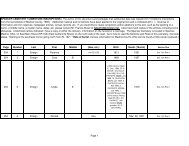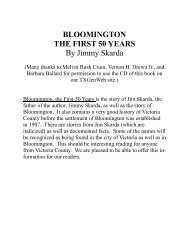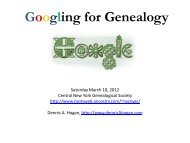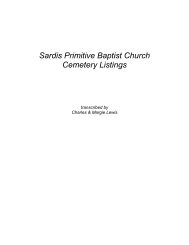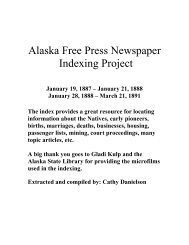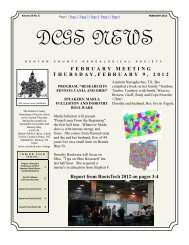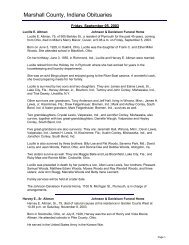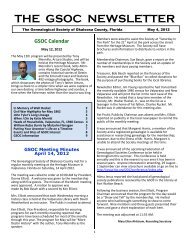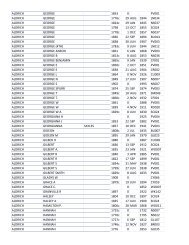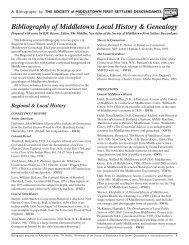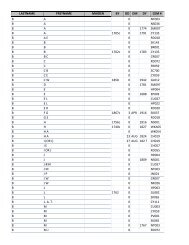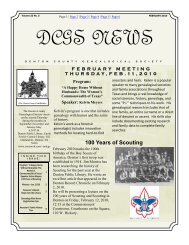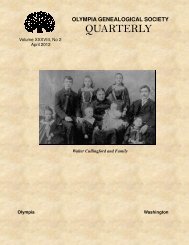Getting to the Roots of Your Family - RootsWeb - Ancestry.com
Getting to the Roots of Your Family - RootsWeb - Ancestry.com
Getting to the Roots of Your Family - RootsWeb - Ancestry.com
Create successful ePaper yourself
Turn your PDF publications into a flip-book with our unique Google optimized e-Paper software.
FAMILY HISTORY PATRON HANDOUT – RESEARCH SERIES<br />
LIBRARY Scottish Nonconformist Church Records<br />
Not all <strong>the</strong> citizens <strong>of</strong> Scotland belonged <strong>to</strong> <strong>the</strong> Established Church. Those who did not are known as<br />
nonconformists. Various nonconformist churches existed and many kept records <strong>of</strong> value.<br />
HISTORICAL BACKGROUND<br />
• Prior <strong>to</strong> <strong>the</strong> 1500s, Scotland was Catholic, as was all <strong>of</strong> Europe.<br />
• In <strong>the</strong> 1500s, John Knox spread Protestantism and came in<strong>to</strong> conflict with Queen Mary. She was<br />
forced <strong>to</strong> abdicate in 1568 and was imprisoned in England where she was later executed.<br />
• In 1552, <strong>the</strong> General Provincial Council ordered each parish <strong>to</strong> keep a register <strong>of</strong> baptisms and<br />
banns <strong>of</strong> marriage. The earliest registers date from 1553.<br />
• In 1560, <strong>the</strong> Catholic Church was abolished and Presbyterianism grew in strength.<br />
• In 1603, James VI <strong>of</strong> Scotland (son <strong>of</strong> Queen Mary) became James I <strong>of</strong> England.<br />
• In 1606, Episcopacy was established in Scotland by James I.<br />
• In 1616, 1636, and again in 1699, laws were passed requiring ministers <strong>to</strong> keep registers.<br />
• In 1638, Episcopacy was abolished, but was res<strong>to</strong>red again in 1661.<br />
• The Church <strong>of</strong> Scotland (Presbyterian) was established permanently in 1690.<br />
• Between 1733 and 1843 <strong>the</strong>re were many secessions from <strong>the</strong> Established Church, affecting<br />
records.<br />
WHEN YOUR ANCESTORS ARE NOT IN SCRI<br />
When you do not find your ances<strong>to</strong>rs in <strong>the</strong> Scottish Church Records Index, it could indicate:<br />
• They were members <strong>of</strong> <strong>the</strong> Established Church but did not get registered.<br />
• They were registered but <strong>the</strong> records were lost over time.<br />
• They were nonconformists - members <strong>of</strong> any church o<strong>the</strong>r than <strong>the</strong> Established church.<br />
• They were a nonconformist family if you find a marriage in <strong>the</strong> SCRI but no children for <strong>the</strong><br />
couple.<br />
HISTORY OF SCOTTISH NONCONFORMITY<br />
• Church <strong>of</strong> Scotland was established permanently in 1690. The first group <strong>of</strong> Presbyterian<br />
nonconformists, formed about <strong>the</strong>n, were <strong>the</strong> Cameronians, later called <strong>the</strong> Reformed<br />
Presbyterian Church.<br />
• The first great secession from <strong>the</strong> Established Church <strong>of</strong> Scotland occurred in 1733 and <strong>the</strong><br />
resulting Secession Church was also called <strong>the</strong> Associate Presbyterian Church.<br />
• In 1747, a breach occurred in <strong>the</strong> Associate Presbyterian Church. The resulting churches were<br />
<strong>the</strong> Associate (Burgher) and General Associate (Anti-Burgher) churches.<br />
• In 1761, ano<strong>the</strong>r group <strong>of</strong> people seceded and formed <strong>the</strong> Relief Presbyterian Church.<br />
• In 1820, <strong>the</strong> majority <strong>of</strong> <strong>the</strong> Burgher and Anti-Burgher congregations merged <strong>to</strong> form <strong>the</strong><br />
United Secession Church. The minorities formed <strong>the</strong> Original Secession Church.



